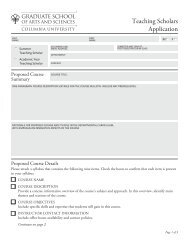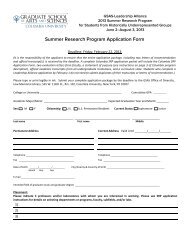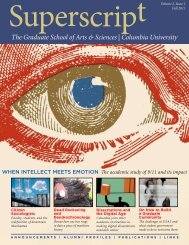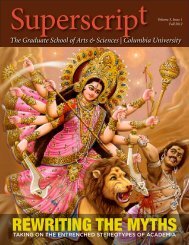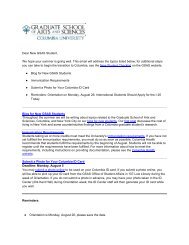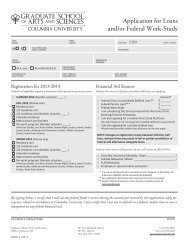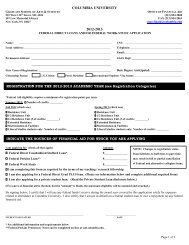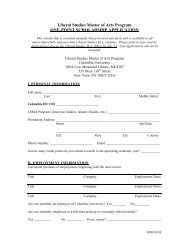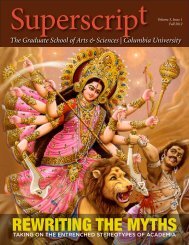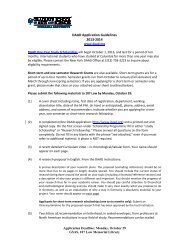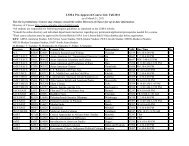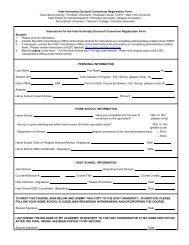PDF for Printing - Graduate School of Arts and Sciences - Columbia ...
PDF for Printing - Graduate School of Arts and Sciences - Columbia ...
PDF for Printing - Graduate School of Arts and Sciences - Columbia ...
- No tags were found...
You also want an ePaper? Increase the reach of your titles
YUMPU automatically turns print PDFs into web optimized ePapers that Google loves.
Supporters <strong>of</strong> open access cite a number <strong>of</strong> reasons why making work digitallyavailable is beneficial to scholars. Among these are the increase in readership<strong>and</strong> in potential citations in other scholars’ research.Traditionally, students completing a Ph.D. degree havebeen required to produce a dissertation that contributesto academic knowledge, <strong>and</strong> which is made accessible <strong>for</strong>other scholars to build upon. Be<strong>for</strong>e the advent <strong>of</strong> onlinein<strong>for</strong>mation resources, this public access was achievedthrough bound copies <strong>of</strong> dissertations made availablethrough university libraries <strong>and</strong> interlibrary loan, as wellas through micr<strong>of</strong>ilm copies accessible through the UMIdissertation abstracts index. Space constraints on libraryshelves, however, <strong>for</strong>ced many universities including<strong>Columbia</strong> to store dissertations <strong>of</strong>f-site, where the likelihood<strong>of</strong> these volumes being read or cited remained low. Ifthe doctoral dissertation is truly meant to be an open contributionto academic knowledge, the Internet has proven tobe the best vehicle to enable it.An open-access work is one that is digital, availableonline, <strong>and</strong> free <strong>of</strong> price barriers such as subscriptionsor licensing fees. Making a work available through openaccess does not require an author to give up copyright onthe work, although some authors do choose to release theirwork without copyright or use a Creative Commons licensethat permits a work to be redistributed, remixed, or builtupon to an extent determined by its author. Early movementsto harness the Internet <strong>for</strong> open-access archiving <strong>of</strong>academic work led to a series <strong>of</strong> meetings that took placein Budapest, Bethesda, <strong>and</strong> Berlin in 2002 <strong>and</strong> 2003. Theresult <strong>of</strong> these meetings was a commonly accepted definition<strong>for</strong> open-access content that emphasized freedom fromprice barriers in accessing in<strong>for</strong>mation <strong>and</strong> the availability<strong>of</strong> works to all legitimate scholarly uses. In the years sincethese meetings, an increasing number <strong>of</strong> universities,research institutions, <strong>and</strong> publishers have embraced whathas come to be called the “BBB definition”—named <strong>for</strong> thethree cities—in providing open-access services.Supporters <strong>of</strong> open access cite a number <strong>of</strong> reasons whymaking work digitally available is beneficial to scholars.Among these are the increase in readership <strong>and</strong> in potentialcitations in other scholars’ research. According to the OpenAccess Scholarly In<strong>for</strong>mation Sourcebook (OASIS), studieshave demonstrated the positive impact that open accesshas on the dissemination <strong>of</strong> research, including substantialincreases in readership <strong>and</strong> citations as well as increasedaccess to scholarly work <strong>for</strong> universities in developing nationswhose budgets do not allow <strong>for</strong> institutional subscriptionsto traditional journals <strong>and</strong> databases. At <strong>Columbia</strong>,another benefit to students completing the dissertation isthe permanent URL assigned to every work made availablein Academic Commons, which enables an always-valid linkto be included in CVs <strong>and</strong> citations.One concern among doctoral students, particularlythose in the humanities, is that open access may interferewith the future publication <strong>of</strong> a book based on the dissertation.While opinions on this vary from editor to editor, it iscommonly understood that a book manuscript should bea very different document from a dissertation. The onlinearchiving <strong>of</strong> a dissertation is unlikely to interfere with thepublication <strong>of</strong> a book. Pr<strong>of</strong>essor Stuart M. Shieber, Director<strong>of</strong> the Office <strong>for</strong> Scholarly Communication at HarvardLink back to contents page10 Superscript



